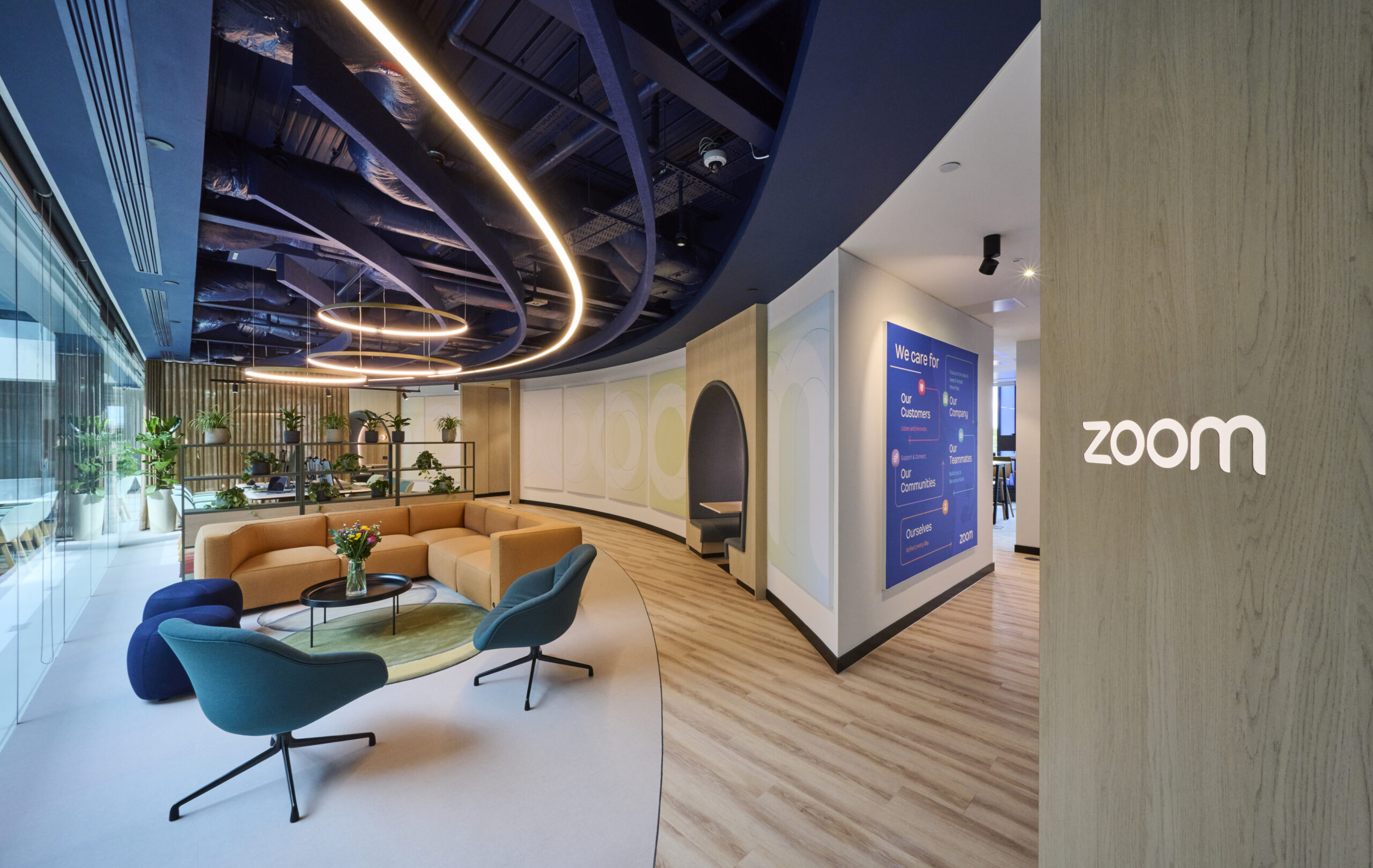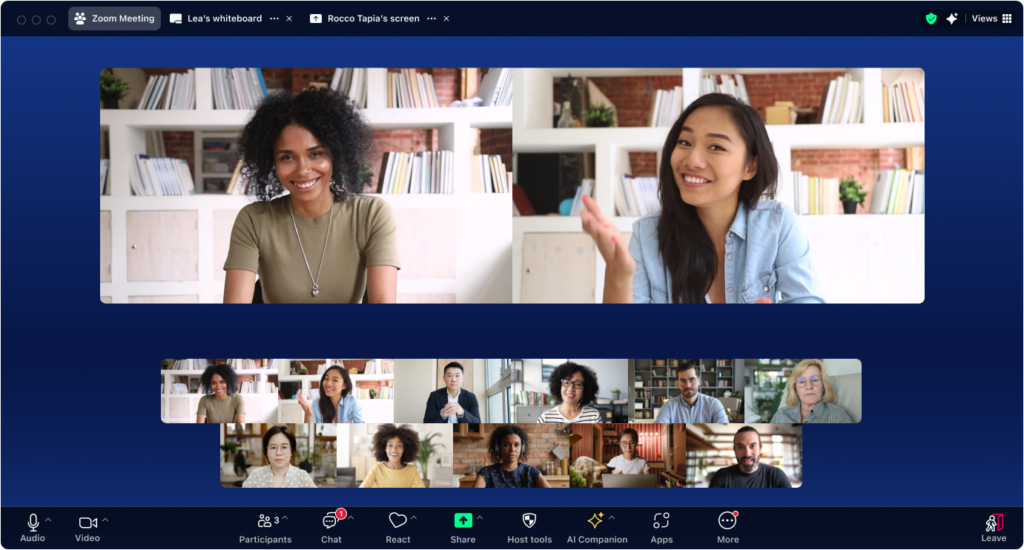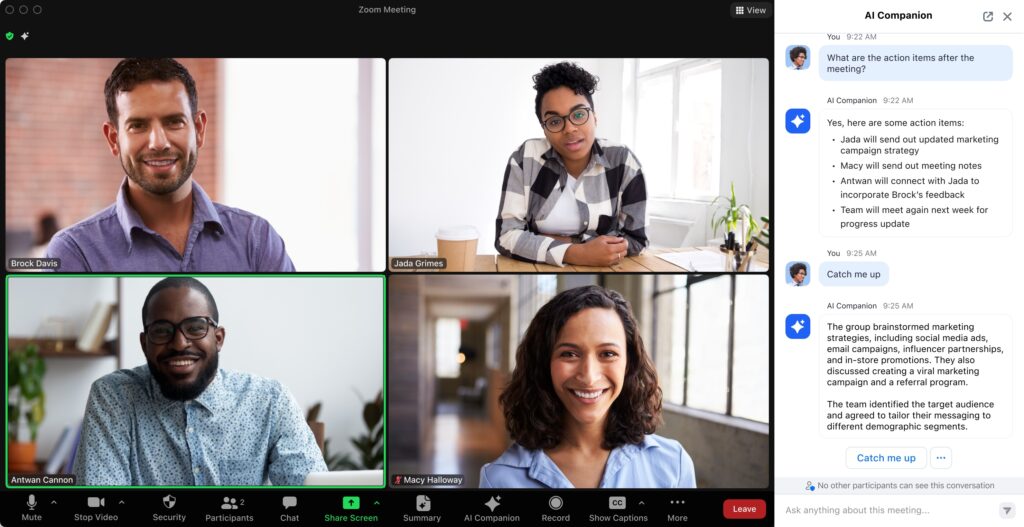While Zoom made headlines this week allegedly mandating a return to the office for its employees, the reality of its latest move seems like an entirely different story. Zoom hasn’t ditched remote altogether, but it is making hybrid work sleeker and more intuitive while showcasing the capabilities of its tech offerings. As headlines hit, ERP Today was invited to visit the new 15,000-square-foot space in Holborn, London in person to discover the company’s employee experience firsthand.
At the start of August, Zoom opened the doors to its new office, or Engagement Hub, in London, with the company spurred to expand its office space amid its growing UK-based workforce of over 200 employees.
On a team-by-team basis, the company has stated that it aims to bring in its team members living within a 50-mile radius of a Zoom office for two days a week, but isn’t mandating a full-time return. It’s also continuing to offer remote working contracts and, in total, the return to the office policy is set to impact just about a third of Zoom’s 7,400 global workforce.
The shift is about achieving a good balance, Charlotte Holloway, head of government relations EMEA at Zoom, tells ERP Today: “We love working on Zoom remotely, but [want] to have those really important team moments where you come together and celebrate something… Or have those day-to-day collaborations that we think need to happen in person.
“So for us, it’s about getting the balance right. We’re really excited about what comes next and the kind of physical spaces that we’ve created means that when people do come together, we’re going to get the most out of that time.”
More than just a digital office cubicle
Zoom’s video conferencing software rose to greater prominence during the pandemic, defining much of our remote-working experience. But in the post-pandemic shift, the firm is out to prove it’s more than just a WFH tool, with ambitions to expand its offering beyond our daily digital meets and branch out to fill the boots of a broader role – a form of office administrator.
The company’s strategy is to move from a direct sales model, like it has been since its launch in 2011, to at least 80 percent of its revenues coming from its partners over the next four years. Building on its partner ecosystems, Zoom is seeking to expand from what was a meetings product, to an all-encompassing unified communications platform.
Visiting the new London offices, we quickly realize that it isn’t merely an office space as such. The hub is fully powered by Zoom’s platform, with 75 work points, to organize and manage the whole experience of employees, customers and prospects visiting the office.
With all of Zoom’s technologies integrated throughout the office, from Virtual Kiosk, which enables the receptionist to manage multiple offices and conduct their usual day-to-day tasks remotely, to Digital Signage with its customizable displays that can be used for wayfinding and company engagement announcements, this office moves beyond the painstaking days of segregated office cubicles, focusing on crafting a holistic office experience with smart tools to make the physicalities of work more assistive.
A Workplace Reservation option in the app allowing employees to select and book their workspace for the day based on their preferred way of working, as well as place their lunch order, navigate the office, get an overview of activity happening in the office and see who is onsite.
Most of us are familiar with the alienating experience of being the only one joining an office meeting remotely, and Zoom has worked to solve this unsettling feeling. Ever ready to try a new enterprise tech tool, we got the chance to demo ‘Zoom Rooms’ during our visit, which combines in-person and virtual engagement.
Features like Smart Gallery enable remote employees to feel like they always have a seat at the table while benefiting from better sound and picture from home. The Intelligent Director feature also uses Zoom’s software to select the best view of in-room participants from multiple camera sources.
Asking Zoom whether its very public shift will likely impact other organizations’ hybrid working too, Drew Smith, director of government relations UKI, tells ERP Today: “I think it will be the same for many other organizations from an employee experience point, if they fail to get that right and they don’t think thoughtfully about how productive their teams can be together, their employees will realize they are missing a trick and perhaps won’t want to stay there.
“We see from survey after survey that having some degree of flexibility is really important to huge numbers of the workforce, particularly for millennials and Gen Zs. So, we expect other organizations to be doing the same thing as us and thinking about how they optimize their space, how they get the most out of their employees in the different ways that they work as a way of attracting and retaining the talent they need to be successful.”
Whether more tech companies will follow suit or not is to be seen, but Zoom is pressing on with its new strategy and is additionally preparing to open an Executive Briefing Center (EBC), right next to the new Engagement Hub, in early 2024. A demonstration space, the center will look to offer a hands-on immersive education experience for employees, prospects and customers to drive business outcomes in an engaging and intelligent environment.
The offices are striking and, following the firm’s recent acquisition of Ireland-based workplace software startup Workvivo, Zoom isn’t stopping with London, it’s looking to create similar spaces in Ireland and beyond. Watch this space – once a remote working enabler, Zoom is out to make hybrid working a more attractive, technology-enabled reality.






